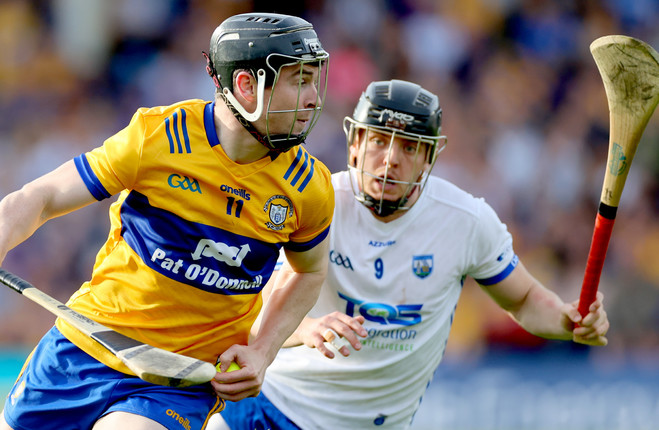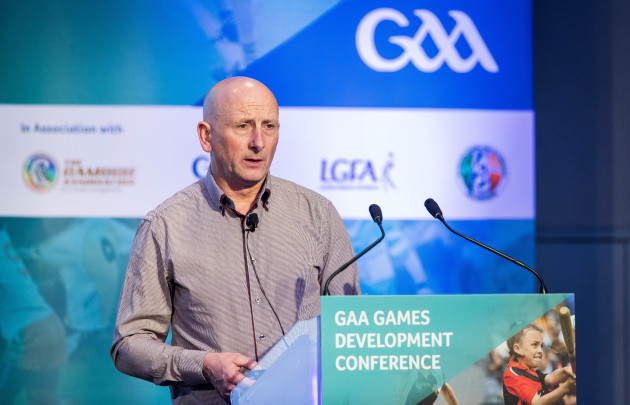I
Hurling is sure of itself.
It is close knit and often appears unconcerned with the world beyond its fervent community. If others want to watch, let them watch. Hurling people know what they’ve got.
“The greatest sport that was ever played by any man,” is how Anthony Daly described it moments after Limerick’s 2018 All-Ireland win.
Such proclamations come easy (and often) in those moments of great ecstasy.
Hurling justifies itself.
It is complex and requires astonishing skill of its leading participants. Elite inter-county hurling is now played at a level incomparable to past generations.
At its best, the game is regularly capable of remarkable drama.
Hurling defends itself.
It is gutsy and acutely aware of any disrespect levelled in its direction. Statements of pride in their own game come easily, but so too does condemnation of others.
Five days after calling on the GAA and RTÉ to treat the broadcasting of hurling matches with greater respect on RTÉ’s own Sunday Game, Donal Óg Cusack used his regular slot on RTÉ Radio 1 to joke about Gaelic football’s second-tier championship, the Tailteann Cup.
“If you haven’t heard of it,” he explained, “[it] is a sort of Gaelic football Grand National for disappointed also-rans.”
Hurling contradicts itself.
II
Less than two weeks before Limerick’s 2018 victory brought the curtain down on a superb championship and Daly extolled hurling’s supremacy, the GAA’s national hurling development manager Martin Fogarty felt comfortable telling Balls.ie that the sport was in a fight for its life across most of the island of Ireland.
He was not dealing in hyperbole.
Almost five years later and the only significant change is that the role Fogarty then inhabited has been vacant since his contract expired in 2021.
Even with the enthusiasm, energy and expertise he had at his disposal, the scale of hurling’s issues are too severe for any one individual to comprehensively address.
For instance, consider the following: Kilkenny GAA clubs field more adult Gaelic football teams than there are adult hurling teams in the counties of Sligo, Mayo, Roscommon, Leitrim, Longford, Louth, Westmeath, Monaghan, Cavan, Donegal, Fermanagh, Tyrone, Down, Derry and Armagh.
With the exception of Down, not one of those counties listed has even half the number of Kilkenny’s 24 adult football teams. Take Armagh, Monaghan, Derry and Roscommon out of the equation, and the remaining counties make up a quarter of that number at best.
If that isn’t challenging enough, the geographical sparsity of what club teams do exist only serves to make finding teams to hurl against all that more difficult. Factor in the sport’s difficulty to master and one can imagine then how varied the capabilities of club sides are in these circumstances.
While the likes of Carlow, Wicklow or Kerry are not inundated with adult hurling teams either, they will benefit from their proximity to stronger hurling counties which boast many club sides of differing capabilities.
And although another raft of club hurling teams can be found at a juvenile level across these counties where the sport is hanging on, players are often drawn from a number of clubs and the threat of scheduling conflicts can sabotage even the most modest plans.
This is an issue both the adult hurlers and the upcoming generation contend with alike.
III
If Donal Óg Cusack himself was given free rein to schedule RTÉ’s hurling coverage for the year, it is difficult to foresee what material difference showing Limerick vs Clare and Cork vs Tipperary would have on hurling’s more glaring accessibility issue.
Let’s be clear on something. The more elite inter-county hurling there is on terrestrial TV the better. And if the additional option exists to stream matches we would otherwise be incapable of watching on GAAGO or any other platform, that can only be a good thing.
Although it is clear that Cusack’s comments on The Sunday Game were primarily driven by this question of broadcasting preferences and the promotion of elite inter-county hurling, it was alluded to that a greater share of television exposure is important to help the game to grow across the country.
Again, the possibility of attracting a greater audience for these games can do no harm whatsoever. That it might provoke parts of the country where hurling barely exists to take up the sport in a meaningful way is no more than a nice theory, however.
Across swathes of the country where hurling has no foothold, the joy one potentially takes in watching TJ Reid, Tony Kelly, Cian Lynch or Noel McGrath on the television cannot be translated into action.
“Hurling needs oxygen,” stressed Cusack on a couple of occasions during that discussion. That depends on what one’s idea of hurling is, realistically. In many counties, hurling is so niche a concern as to require full scale resuscitation.
IV
Sat next to Cusack in The Sunday Game studio, Jackie Tyrrell acknowledged the relative scarcity of hurling’s proud community. Even for the likes of those from Kilkenny or Cork, it’s all too easy to identify where the game lacks a meaningful foothold.
And yet, the people from within hurling’s strongholds have and continue to fulfil their end of the bargain for the game’s betterment. It is thanks to these strongest counties that hurling manages to breakthrough at all.
There is a natural degree of looking out for your own lot that influences what Cusack, Tyrrell and any number of high profile hurling figures want from increasing the visibility and promotion of hurling at the level they are most familiar with it.
This might not do a whole lot for the game at large, but it is important as Cusack suggested that people in the public eye or positions of power “have hurling’s back”.
Perhaps the weakness of hurling as a national concern is a problem that cannot be solved then. Although any number of volunteers have given an unimaginable amount of time to the far more popular game of Gaelic football, it can never have been in such dire straits as to require the kind of attention hurling requires.
To advance and hope that hurling might be saved, however, the impetus to act lies squarely with the GAA.
The tiered hurling championships have been a positive step forward where those most severely challenged counties have a competition that befits their capabilities. Yet, the actual competitiveness of many counties therein is a greater endorsement of the hard work being done at ground level by committed individuals than evidence of a deeper structure at work.
Hurling is thriving and hurling is dying. Hurling is everything and hurling is nothing.
Hurling contains multitudes.


